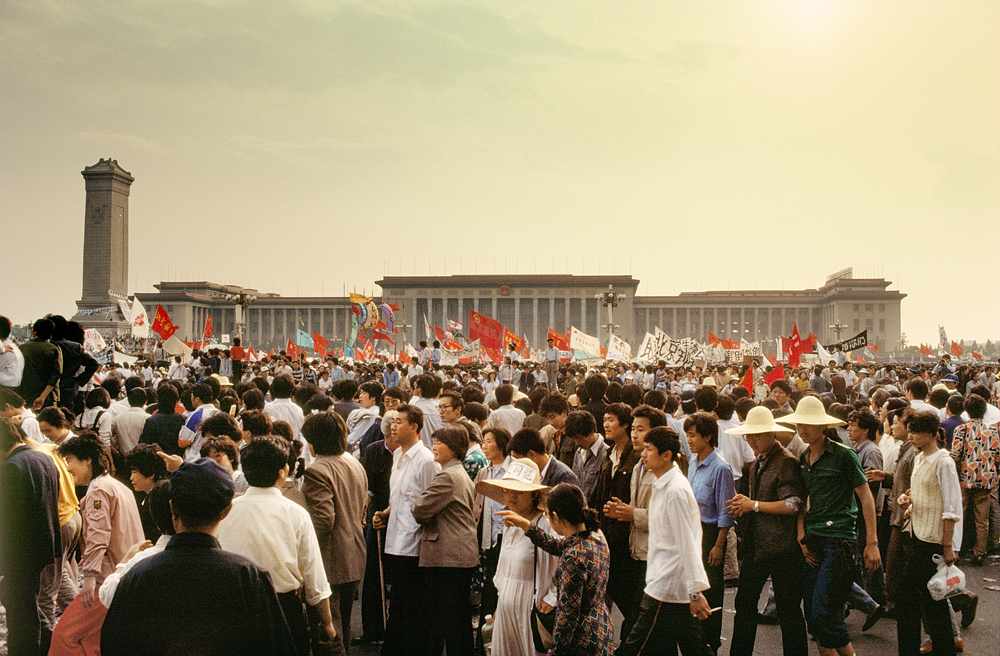Documents recently unclassified by the U.K.’s National Archives reveal that the British embassy in Beijing was warned that Deng Xiaoping had claimed, in the days before the June 4, 1989 crackdown on pro-democracy protesters, that, “Two hundred dead could bring 20 years of peace to China.” Zheping Huang and Ilaria Maria Sala report for Quartz:
The UK’s National Archives released on Dec. 30 a huge number of previously secret government files from 1989 and 1990. Over two dozen documents (pdf) dated between May 20 and July 21 in 1989 revealed the Margaret Thatcher administration’s understanding of the political climate in China in the lead-up to the crackdown. A major reveal: The UK embassy in Beijing knew two weeks before June 4 that the People’s Liberation Army was preparing to kill hundreds, if not thousands, of student protesters who had been gathering at Beijing’s main square for weeks.
On May 20, 1989, a month after students started occupying Tiananmen Square calling for democratic reform in the Communist Party, Deng declared martial law and deployed 300,000 troops to Beijing. On the same day, Sir Alan Ewen Donald, Britain’s ambassador to China, sent Downing Street a telegram about his lunch with American sinologist Stuart Schram.
“Professor Stuart Schram confided to me that one of his Chinese contacts had told him that in recent days Deng Xiaoping commented that ‘two hundred dead could bring 20 years of peace to China’,” Donald wrote. “The implication clearly was that the sacrifice of a number of demonstrators lives now would stabilize the present situation and buy the time needed to complete the reform of China.”
Donald went on to say that he learned from the Pentagon on the same night that the Chinese authorities had decided “there is no way to avoid bloodshed,” so they recalled state hospital staffers to their workplaces and instructed the troops to “do what is necessary to put down the situation.” [Source]
In 2015, Library and Archives Canada released thousands of cables sent by their embassy in Beijing in the days surrounding the June 4 crackdown, describing the situation as, “grim at best and potentially disastrous.”
A new book, “Tiananmen Redux,” by Johan Lagerkvist, gives the author’s analysis of the impact of Deng’s decision to send troops in to quell the pro-democracy protests in Tiananmen Square. Richard Bernstein reviews the book for The Wall Street Journal:
The day of the crackdown, June 4, 1989, in this sense marked a decisive moment in China’s long history. But the Swedish Sinologist Johan Lagerkvist goes further in “Tiananmen Redux: The Hard Truth about the Expanded Neoliberal World Order.” For Mr. Lagerkvist, Tiananmen was not just a watershed in Chinese history but a watershed for the world, more important in its permanent impact than such near contemporaneous occurrences as the fall of the Berlin Wall and the disintegration of the Soviet Union.
His argument is essentially this: The violent denouement of the Tiananmen demonstrations brought about something more than the definitive eradication of any opposition to the authority of the one-party state. It also released paramount leader Deng Xiaoping to accelerate China’s transformation from a poverty-stricken Maoist country to a rich and powerful capitalist one. What is most important in Mr. Lagerkvist’s scheme is that Tiananmen allowed the 84-year-old Deng to press on his reluctant co-elders in the party a neoliberal economic agenda, by which he means a kind of savage capitalism, with low wages, reduced social welfare benefits and yawning gaps between the rich and the poor. All the well-publicized ills of globalization thus originate in China’s decision to go for rapid economic growth no matter the costs. [Source]
Hong Kong Free Press has published a series of photos taken on June 4 in and around Tiananmen Square.








